Five reasons Bend It Like Beckham is still iconic
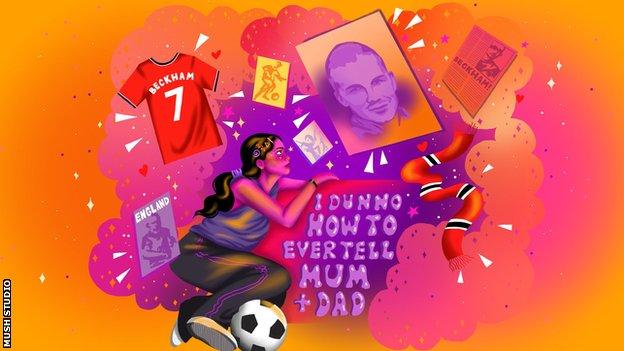
| Bend It Like Beckham: 20 Years On will broadcast on BBC iPlayer on Friday, 15 April at 14:30 BST, Sunday, 17 April at 10:30 BST and Monday, 18 April at 09:30 BST |
Grossing almost £60m on a budget of £3.5m, it was the surprise hit that told the story of a young British-Indian girl with a passion for football.
Bend It Like Beckham explored themes of identity, race, gender, sexuality, religion and immigration and, for many, was a cultural moment that remains timeless.
Here are five reasons the film is still iconic 20 years on.
It showed us football is for everyone
On the surface, Bend It Like Beckham is a film about a football-loving teenager from a British-Indian Sikh family in London. But when you look a bit deeper, it explores much more.
The film was inspired by former Arsenal and England striker Ian Wright. When director Gurinder Chadha saw a photograph of Wright wearing a union jack, it made her think about what Britishness really meant in the late 1990s, and she decided to write a film about the “evolving concept of Britishness”.
For many British-South Asian girls, the film was an important moment as it gave us Jesminder Bhamra. Jess was the closest thing to a sporting role model we’d ever had, and would have for years to come.
She had a huge impact on audiences as she shared the same lived experiences – both negative and positive – as many girls and women who played (and play) sport in the UK.
But the film also uses football to navigate other coming-of-age themes including sexuality, with Jess’ best friend Tony coming out to her by saying: “No, I really like Beckham.”
It also shows just how accessible football is, and one simple conversation shows just how much the women’s game in the UK has developed in the past 20 years.
When Jess is told by her friend and team-mate Jules – played by Keira Knightley – that she wants to be a professional footballer, her reaction is of the time.
“Not really here, but you can in America – they’ve got a pro-league with new stadiums and everything,” she says.
Two decades on, of course, some of the best American players come to play in the Women’s Super League, which is among the best professional women’s leagues in the world.
It reminds us of the power of sport
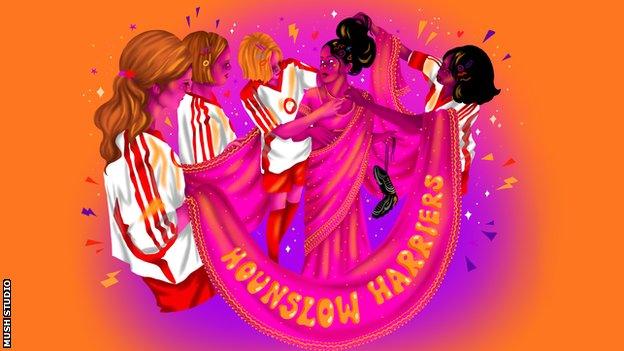
Because Jess’ parents don’t want her to play football, the film is as much about generational culture clashes as it is about British and Indian culture clashes.
It’s one reason the film is so relatable for anyone whose parents have wanted them to focus on education – or getting a job, or married – instead of playing sport.
When Jess does play, she comes alive – and they are some of her happiest moments in the film.
She is also among the characters we see navigating through British society with a home life so different to that culture.
Jess creates and chooses her own cultural identity, and sport is a huge part of that. She lets her mum teach her how to cook traditional Indian food, but does knee-ups with the cabbage. When doing chores, she bends a football around the washing line. All the time we see her intertwining her love for football with her identity and culture.
We also see the power sport can have in integration.
A talented cricketer, Jess’ father stopped playing when he emigrated to London because English teams wouldn’t let him play, and he was racially abused. When Jess’ coach Joe tries to persuade her parents things have changed, her dad says: “None of our boys are in any of the football leagues. You think they will let our girls?”
But when Jess leaves after receiving a life-changing football scholarship from a US university, her father starts playing cricket again.
Jess’ hybrid identity helps remind us sport is a universal language with the power to aid integration.
It taught us the concept of bending
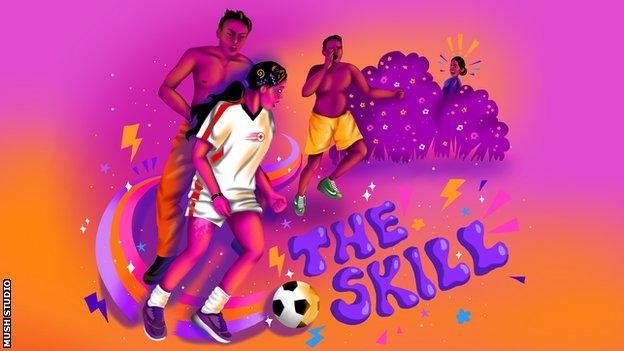
You might think bending a ball like David Beckham is a one-dimensional concept, but there’s much more to the film’s title than that.
In a 2003 interview, Chadha explained Bend It Like Beckham was actually a “great metaphor for a lot of us, especially girls”.
“We can see our goal but instead of going straight there, we too have to twist and bend the rules sometimes to get what we want – no matter where ‘we’ reside, no matter what group ‘we’ claim or do not embrace as part of ‘our’ ethnic lineage,” she added.
In nearly every scene of the film, we see Jess bend rules from her family and community so she can live out her dreams. She never rejects her culture, she finds ways of adapting. It’s the same when Jules bends the ‘rules’ of what it means to be a woman – rejecting her mum’s demand to dress in a more “feminine” way to embrace her tomboy identity.
And, eventually, Jess has the rules bent for her as her father allows her to sneak out of her sister’s wedding to play a game for Hounslow Harriers in front of an American scout.
It’s still quoted today
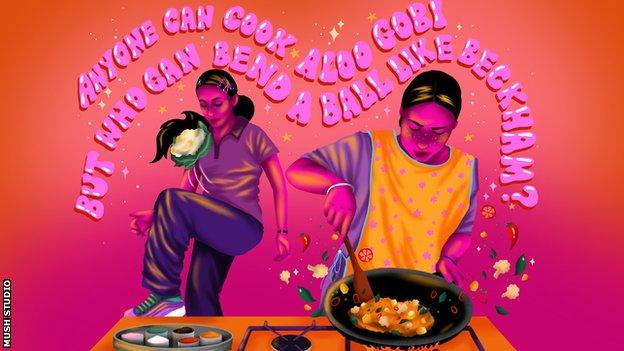
The Bend It Like Beckham quotes are legendary.
“Anyone can cook aloo gobi but who can bend a ball like Beckham?”
“Don’t worry, with one of our designs even these mosquito bites will look like juicy, juicy mangoes!”
“The offside rule is when the French mustard has to be between the teriyaki sauce and the sea salt.”
“Anyway, being a lesbian’s not that big a deal… oh no, of course not sweetheart. I mean, I’ve got nothing against it. I was cheering for Martina Navratilova as much as the next person.”
“What family would want a daughter-in-law who can run around kicking football all day but can’t make round chapatis?”
The quotes are timeless because, although they seem like they’re specific to the characters they’re about, they’re things anyone can relate to.
They’re one-liners, ultimately, but behind each word sits a plot each character is navigating while trying to create their own identity.
It’s hilarious
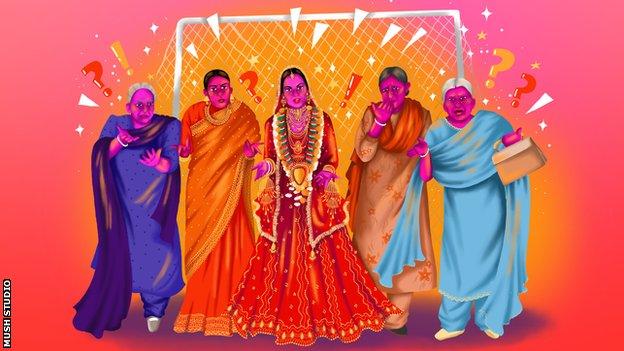
One of the best things about Bend it Like Beckham is it’s still hilarious today. The humour is used to engage audiences, taking them through storylines that could otherwise be difficult to watch.
Memes and gifs of the film still circulate on social media, whether it’s the celebrations of the Hounslow Harriers or the famous Desi wall of defenders in the illustration above.
And although the scene where Jess is taking a free-kick and imagines her relatives in goal is hilarious, it’s also a striking image that reminds us we’ve seen Jess create her own identity, mixing her culture, family and sport.
She’s able to leave her sister’s wedding with the approval of her dad, then scores a free-kick while imagining family members as defenders by bending the ball around them, just like Beckham. The free-kick wins the game for Hounslow Harriers and is seen by an American scout, which leads to that football scholarship and a future the audience hope will make her parents proud.
But, most importantly, allow her to be unapologetically herself.


For all the latest Entertainment News Click Here
For the latest news and updates, follow us on Google News.

